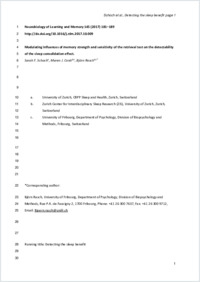Modulating influences of memory strength and sensitivity of the retrieval test on the detectability of the sleep consolidation effect
- Schoch, Sarah F. University of Zurich, CRPP Sleep and Health, Zurich, Switzerland
- Cordi, Maren J. Zurich Center for Interdisciplinary Sleep Research (ZiS), University of Zurich, Zurich, Switzerland / University of Fribourg, Department of Psychology, Division of Cognitive Biopsychology and Methods, Fribourg, Switzerland
- Rasch, Björn Zurich Center for Interdisciplinary Sleep Research (ZiS), University of Zurich, Zurich, Switzerland / University of Fribourg, Department of Psychology, Division of Cognitive Biopsychology and Methods, Fribourg, Switzerland
-
2017
Published in:
- Neurobiology of Learning and Memory. - 2017, vol. 145, p. 181-189
English
Emotionality can increase recall probability of memories as emotional information is highly relevant for future adaptive behavior. It has been proposed that memory processes acting during sleep selectively promote the consolidation of emotional memories, so that neutral memories no longer profit from sleep consolidation after learning. This appears as a selective effect of sleep for emotional memories. However, other factors contribute to the appearance of a consolidation benefit and influence this interpretation. Here we show that the strength of the memory trace before sleep and the sensitivity of the retrieval test after sleep are critical factors contributing to the detection of the benefit of sleep on memory for emotional and neutral stimuli. 228 subjects learned emotional and neutral pictures and completed a free recall after a 12-h retention interval of either sleep or wakefulness. We manipulated memory strength by including an immediate retrieval test before the retention interval in half of the participants. In addition, we varied the sensitivity of the retrieval test by including an interference learning task before retrieval testing in half of the participants. We show that a “selective” benefit of sleep for emotional memories only occurs in the condition with high memory strength. Furthermore, this “selective” benefit disappeared when we controlled for the memory strength before the retention interval and used a highly sensitive retrieval test. Our results indicate that although sleep benefits are more robust for emotional memories, neutral memories similarly profit from sleep after learning when more sensitive indicators are used. We conclude that whether sleep benefits on memory appear depends on several factors, including emotion, memory strength and sensitivity of the retrieval test.
- Faculty
- Faculté des lettres et des sciences humaines
- Department
- Département de Psychologie
- Language
-
- English
- Classification
- Psychology
- License
-
License undefined
- Identifiers
-
- RERO DOC 323252
- DOI 10.1016/j.nlm.2017.10.009
- Persistent URL
- https://folia.unifr.ch/unifr/documents/306963
Statistics
Document views: 133
File downloads:
- Texte intégral: 183
